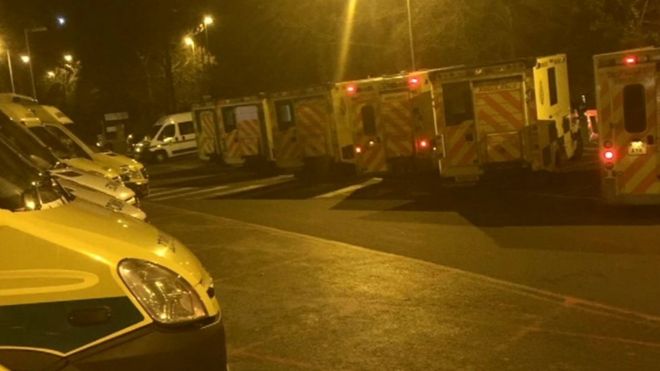Should we really be berating our doctors nurses and paramedics for not hitting their targets. I don’t think so.
Having been an intensive care nurse in the past, I’ve taken handover many times from paramedics ranging for 10 to 45 minutes. It’s crucial to get a good handover, it’s a life saver. Maybe it’s not so difficult to see the problem, the emergency services are simply underfunded, resulting in understaffing.
Queen Alexandra Hospital: Ambulance handovers missed targets

The time taken to off-load emergency patients from ambulances at a Portsmouth hospital has exceeded an hour more than 1,300 times in 10 months, figures show.
Handover times at the Queen Alexandra Hospital (QA) failed to meet targets on 11,620 occasions, the BBC found.
The hospital was criticised last month when a third of Hampshire’s on-duty ambulances were queuing outside.
The ambulance service said transfer times were a “top priority”.
The QA’s emergency department was described as “severely overcrowded” in a Care Quality Commission (CQC) report in June, and in October the trust’s chief executive raised concerns about the hospital’s high occupancy rate.
Government guidelines state patients should be handed over from the care of ambulance crews to hospital staff in under 15 minutes.
Figures for hospitals in the south in England, obtained under the Freedom of Information Act, showed the transfer process at the QA took more than an hour 1,340 times between January and November 2015.
The total at Southampton General Hospital, comparable in size to the QA, was 111.
On 21 February, paramedics and patients complained about ambulances being held the QA car park for up to seven hours.
At one point a third of Hampshire’s on-duty fleet of 46 ambulances were stacked at the hospital.
‘Minimise delays’
Portsmouth Hospitals NHS Trust later apologised for treating patients in ambulances and blamed the situation on the emergency department being “exceptionally busy”.
Mark Ainsworth, Director of Operations at South Central Ambulance Service (SCAS), said: “We work in partnership with all hospitals to ensure that we are able to effectively hand our patients into the care of the hospital and response to the next patient who may require our help.
“Working with our hospital partners to minimise delays in handing over patients to local emergency departments is a top priority for SCAS.”
The figures also show 60% of handovers at Poole Hospital took more than 15 minutes.
Both Poole and the Royal Bournemouth Hospital have seen an increase in handover times, year-on-year.
The South Western Ambulance Service Trust said it was working to minimise delays.
“On average, more than 55% of our patients are treated via other, more appropriate, care pathways at home or within the community, either face-to-face or over the phone, without needing to attend an emergency department,” a spokeswoman said.
Mark Mould, Poole Hospital’s chief operating officer, said it was experiencing “sustained and exceptional demand” and added that “new procedures” had been introduced to try and improve patient handovers.
“We would encourage people to use the ambulance service only when it is really an emergency. We know our ambulance colleagues are facing considerable pressures and it is vital that such an important resource is used appropriately so it is available for those who truly need it,” he added.
A spokesman for Portsmouth Hospitals NHS Trust said: “We have been experiencing an extremely high demand on our emergency department, with huge numbers of very sick, frail and elderly patients requiring emergency care.
“These increased elderly admissions, and the acuity of patients who are coming through our doors, does impact on our ability to accommodate, in a timely fashion, all ambulance arrivals.
“We know that patient experience has been affected as a result of the pressures, and we are committed to improving access to emergency care.”

